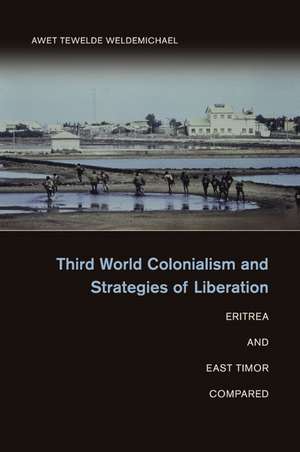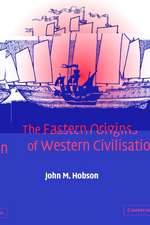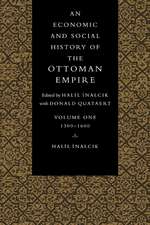Third World Colonialism and Strategies of Liberation: Eritrea and East Timor Compared
Autor Awet Tewelde Weldemichaelen Limba Engleză Paperback – 9 mar 2016
| Toate formatele și edițiile | Preț | Express |
|---|---|---|
| Paperback (1) | 242.38 lei 6-8 săpt. | |
| Cambridge University Press – 9 mar 2016 | 242.38 lei 6-8 săpt. | |
| Hardback (1) | 530.99 lei 6-8 săpt. | |
| Cambridge University Press – 18 noi 2012 | 530.99 lei 6-8 săpt. |
Preț: 242.38 lei
Nou
Puncte Express: 364
Preț estimativ în valută:
46.38€ • 48.52$ • 38.53£
46.38€ • 48.52$ • 38.53£
Carte tipărită la comandă
Livrare economică 02-16 aprilie
Preluare comenzi: 021 569.72.76
Specificații
ISBN-13: 9781107576520
ISBN-10: 1107576520
Pagini: 368
Ilustrații: 2 maps
Dimensiuni: 153 x 228 x 24 mm
Greutate: 0.54 kg
Editura: Cambridge University Press
Colecția Cambridge University Press
Locul publicării:New York, United States
ISBN-10: 1107576520
Pagini: 368
Ilustrații: 2 maps
Dimensiuni: 153 x 228 x 24 mm
Greutate: 0.54 kg
Editura: Cambridge University Press
Colecția Cambridge University Press
Locul publicării:New York, United States
Cuprins
Introduction; 1. Swaggering empires and defiant 'new provinces'; 2. Bittersweet replicas of foreign experiences and reform; 3. Toward reorganization and reorientation: Eritrean fragmentation and East Timorese near-defeat; 4. Victims of their own success: the revitalized nationalist movements and their challenges; 5. Eritrean and East Timorese diplomacy of liberation; 6. To Asmara through Addis Ababa and Dili via Jakarta; 7. Winning insurgencies and counterinsurgencies in a changing global order; 8. The promise and quandary of 'infusing fresh blood' and 'inaugurating new politics'; Conclusion.
Recenzii
'In Third World Colonialism and Strategies of Liberation, Awet Tewelde Weldemichael narrates the experiences of these remarkable but often under-appreciated nationalist movements during struggles against both primary (European) and secondary (regional) colonial powers with a rare combination of laser-like precision and contextual breadth and depth that brings them alive and renders them comprehensible on their own terms. The unique strength of this work lies in the details he has ferreted out from key actors and informants, much of it available for the first time, that gives them both texture and density. In doing so, he provides us with one of the most clear and compelling accounts so far on not one but two intensely complex but vitally important political events, traditionally treated as isolated anomalies.' Dan Connell, author of Against All Odds: A Chronicle of the Eritrean Revolution
'Awet Tewelde Weldemichael's Third World Colonialism and Strategies of Liberation … is a well-conceived and brilliantly written comparative analysis of the colonial resistance of two Third World wars of national liberation that were fought not against powerful European or Asian colonialists, but against hegemonic states in their own regions. The book is based on extensive fieldwork and careful historical-political analysis of a subject that is often ignored, and is a welcome addition to the field of comparative historical analysis.' Edmond J. Keller, University of California, Los Angeles
'Awet Tewelde Weldemichael has written an excellent history of two liberation struggles: Eritrea's and East Timor's. The two stories make for absorbing and instructive reading by anyone interested in twentieth-century liberation movements. The detailed discussion of the similarities and differences between the Eritrean and East Timorese liberation struggles provides fascinating case studies for history and comparative study buffs. The study re-examines the premise of previously held theories and views on the power tactics and strategies of survival of local groups engaged in a life-and-death struggle, as well as what kind of political system emerges as a result, and to what extent the armed struggle shapes these systems. In that sense, this study makes a significant contribution to historical and political studies.' Bereket Habte Selassie, University of North Carolina, Chapel Hill
'Awet Tewelde Weldemichael's Third World Colonialism and Strategies of Liberation … is a well-conceived and brilliantly written comparative analysis of the colonial resistance of two Third World wars of national liberation that were fought not against powerful European or Asian colonialists, but against hegemonic states in their own regions. The book is based on extensive fieldwork and careful historical-political analysis of a subject that is often ignored, and is a welcome addition to the field of comparative historical analysis.' Edmond J. Keller, University of California, Los Angeles
'Awet Tewelde Weldemichael has written an excellent history of two liberation struggles: Eritrea's and East Timor's. The two stories make for absorbing and instructive reading by anyone interested in twentieth-century liberation movements. The detailed discussion of the similarities and differences between the Eritrean and East Timorese liberation struggles provides fascinating case studies for history and comparative study buffs. The study re-examines the premise of previously held theories and views on the power tactics and strategies of survival of local groups engaged in a life-and-death struggle, as well as what kind of political system emerges as a result, and to what extent the armed struggle shapes these systems. In that sense, this study makes a significant contribution to historical and political studies.' Bereket Habte Selassie, University of North Carolina, Chapel Hill
Descriere
This book shows how Eritrea and East Timor developed sophisticated strategies to liberate their countries from colonialism, and emphasizes that these insurgencies avoided terrorism.









